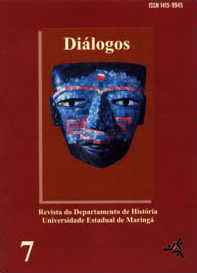Aproximación al concepto histórico de Carlos Ibarguren a través de su correspondencia y otros escritos
Abstract
Este trabalho se propõe realizar uma primeira aproximação ao conceito histórico do Dr. Carlos Ibarguren (1877-1956), uma das figuras principais do pensamento argentino da primeira metade do século XX, pouco estudada até agora, apesar de haver sido referência obrigatória entre os intelectuais de sua época. O presente trabalho se apóia nos manuscritos originais de suas obras, correspondência e resenhas jornalísticas, havendo-nos limitado à análise de suas obras sobre o período rosista, “Manuelita” e “Juan Manuel de Rosas – Su vida, su tiempo su drama”, dada a transcendência e repercussão que tiveram, tanto no âmbito nacional como no estrangeiro. Entre a publicação da primeira e a da segunda edição deste último livro ocorreu a revolução de 1930, fato político que, em nosso entender, contribui para explicar as correlações e modificações que apresenta a segunda versão. A análise dos contextos que servem de marco a ambas as edições joga luz sobre a evolução do pensamento de Ibarguren. Tendo-se em conta que a História é uma disciplina cujas técnicas de produção deixam marcas textuais, se procurou analisar os pressupostos teórico-metodológicos e a prática da escrita, a fim de desentranhar sua concepção histórica, as perspectivas subjacentes e a influência de correntes historiográficas, analisando-se a forma que tem Ibarguren de construir o relato histórico à luz de categorias centrais, como: a relação sujeito/objeto, teoria/empiria, interdisciplinaridade, concepção de tempo e causalidade. Abstract. This work aims at achieving a first approach to the historical conception of Dr. Carlos Ibarguren (1877-1956), one of the main figures of the Argentinean intellectuality of the first half of the XX century. He has not been very much studied until now, in spite of having been one of an almost essential reference among the intellectuals of his time. Upon the basis of the documental corpus of reference: original handwritings of his works, correspondence and journalistic reviews, we have limited ourselves to the analysis of his works on the rosista period: “Manuelita” and “Juan Manuel de Rosas- Su vida, su tiempo, su drama” They were chosen due to the transcendence and repercussions that they had, both in the national and foreign intellectual world. The revolution of September 6, 1930 took place between the first and the second publication of this last book; we believe that this political event justifies the corrections and modifications that are present in the second edition. The analysis of the production contexts of both editions sheds lights on the evolution of Ibarguren thought. Taking into account that the History is a practice involving production techniques that leave textual marks, we had attempted at analyzing the theoretic methodological assumptions and the practice of writing so as to figure out the historical conception, the underlying perspectives and the influence of historiographic trends. It is a reflection on the way on which Ibarguren constructs the historical account, in the light of central categories such as: the relation subject/object, theory/empiry, interdisciplinariety, time conception and causality.Downloads
DECLARAÇÃO DE ORIGINALIDADE E CESSÃO DE DIREITOS AUTORAIS
Declaro que o presente artigo é original, não tendo sido submetido à publicação em qualquer outro periódico nacional ou internacional, quer seja em parte ou em sua totalidade. Declaro, ainda, que uma vez publicado na revista DIÁLOGOS, editada pela Universidade Estadual de Maringá, o mesmo jamais será submetido por mim ou por qualquer um dos demais co-autores a qualquer outro periódico. Através deste instrumento, em meu nome e em nome dos demais co-autores, porventura existentes, cedo os direitos autorais do referido artigo à Universidade Estadual de Maringá e declaro estar ciente de que a não observância deste compromisso submeterá o infrator a sanções e penas previstas na Lei de Proteção de Direitos Autorias (N. 9609, de 19/02/98).
STATEMENT OF ORIGINALITY AND COPYRIGHT CESSION
I declare that the present article is original, has not been submitted for publishing on any other national or international journal, neither partly nor fully. I further declare that, once published on DIÁLOGOS journal, edited by the State University of Maringá, it will never be submitted by me or by any of the other co-authors to another journal. By means of this instrument, on my behalf and on behalf of the other co-authors, if any, I waive the copyright of said article to the State University of Maringá and declare that I am aware that non-compliance with this commitment will subject the violator to sanctions and penalties set forth in the Copyright Protection Law (No 9609, of 19/02/98).

















